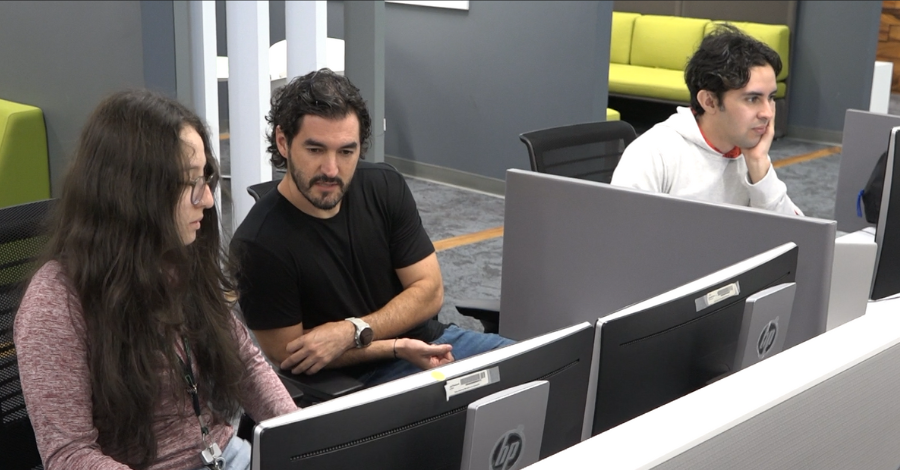NEWS
Costa Rica Must Accelerate Actions to Address the Decline in New Employment
- INEC, PEN, and CINDE participated in the event, "Employment and Talent in Costa Rica: Are we facing the perfect storm? Necessary and urgent actions to move forward."
- CINDE announced that in 2023, multinational companies in the life sciences, services, tourist infrastructure, and advanced manufacturing sectors generated a net total of 5,574 jobs – only 27% of what was reported in 2022.
- Global phenomena, a decline in local competitiveness factors, country uncertainty, and a talent gap are among the reasons behind this decline.
San José, December 13, 2023: CINDE, the State of the Nation Program (PEN, from its acronym in Spanish), and the National Institute of Statistics and Censuses (INEC, from its acronym in Spanish) analyzed the country's employment figures, 2023 data from the multinational sector, and the reality of the Costa Rican workforce’s professional development and their connection to the market.
The meeting raised the point that Costa Rica is facing challenges of competitiveness and talent preparation for employability, which means the country must accelerate its efforts. For the first time in the last 15 years, employment data for the multinational sector has decelerated, thus necessitating greater attention to the issues currently affecting the country. It is suggested that there is a new dynamic in employment.
Jorge Vargas Cullell, Director of the State of the Nation Program, commented that the established history has always been the challenge between production growth and, especially, employment growth. This is particularly evident at small-sized companies facing a hostile business environment, making them even more vulnerable, as compared to larger producers and companies within the free trade zone regime.
"The business park is comprised of around 77,000 formal companies, the majority of which are small in size. The contribution these micro-businesses made to sales and employment represents only 14% and 15% of the total, respectively. On the other hand, larger companies, although accounting for 2% of the business park, are responsible for the majority of formal employment and 62% of the country's sales," Cullell stated.
"Now we are facing a not-so-well-known story. The data is showing a deceleration in the net job generation at multinational companies, in sectors that have [historically] been highly dynamic," he added.
Deceleration in Net Employment at Multinational Companies
According to CINDE data, 2023 concluded with 5,574 net jobs. This represents only 27% of the employment generated in 2022. The data corresponds to real figures from 429 companies across service sectors, including tourist infrastructure, medical devices, and advanced manufacturing.
"For 2023, we observe a deceleration in terms of net employment in dynamic and robust sectors, such as life sciences, services, tourist infrastructure, and advanced manufacturing. This calls for immediate reflection and, above all, the implementation of immediate actions to address the global challenges and local competitiveness issues that impacted the generation of greater opportunities for Costa Ricans," stated Marianela Urgellés, Managing Director of CINDE.
"While it is true that there are elements of global impact and post-pandemic stabilization, which may be part of the reasons for the decline in employment, we clearly see significant near-future job opportunities in aspects of the business climate that are within Costa Rica's control. For years, CINDE has spoken out regarding the existing talent gap and the shortage of bilingual personnel, for example. Likewise, issues such as new non-fiscal incentives and stabilization of local conditions represent competitiveness elements that we must address," reinforced Vanessa Gibson, Director of Investment Climate at CINDE.
CINDE reports net employment at multinational companies in corporate services, life sciences, advanced manufacturing, and tourist infrastructure, based on verified real employment data with figures from the Costa Rican Social Security Fund (CCSS, from its acronym in Spanish)
For the first time, the life sciences sector was the main generator of net jobs, totaling 4,720 (85% of the total), followed by the services sector with 1,455 jobs.
On the other hand, the advanced manufacturing sector showed negative figures. In the balance between total jobs generated and those lost, the sector recorded -634 jobs.
CINDE explained that, although the life sciences sector sustained net employment and had positive growth, this was less than in previous years. As for manufacturing, they indicated that the sector continues to face significant challenges; according to CINDE's criteria, there are opportunities for recovery by developing the semiconductor supply chain.
Finally, CINDE mentioned that, for the second consecutive year, the majority of net jobs are held by women. Female employment represented 55.5% of total generated employment.
Among the figures presented, they also noted that, out of the 429 companies analyzed, 35% decreased their workforce this year, as compared to 23% in 2022.
A Perfect Storm or an Anomalous Year?
According to data from INEC and presented by Pilar Ramos, Coordinator of the National Statistics Program, employment trends have demonstrated a sustained impact in recent years, with a decline in employment that particularly affects the young workforce, more noticeably in women, as well as an increase in the number of unemployed individuals with a completed secondary education.
Vargas Cullell added that it is important to analyze the new data provided by CINDE regarding a sector’s deceleration, such as the multinational sector, which has typically been growing at faster rates than the rest of the economy.
According to CINDE, some potential reasons that may explain this decline include the impact of conflicting elements in the global economy, such as:
- hiring freezes, influence of the primary trading partner (USA), competition in special regimes, pandemic rebound in foreign direct investment flows, and talent shortage.
At the local level, potential reasons highlighted included:
- deterioration in competitiveness elements and uncertainty, the arrival of new projects (but on a smaller scale), more controlled reinvestments in terms of employment, direct relation to the challenges faced by the U.S. market, and a lack of talent that meets company demands.
A Call to Action
CINDE’s Vanessa Gibson reinforced the message of seeking to align Costa Rican talent’s supply and demand by aiming to improve English language proficiency and providing continuous training in areas of high global demand.
On the other hand, Vargas Cullell stated that we are at the point that necessitates insistence, prevention, and adaptation of countrywide measures. Issues such as job prospecting, the creation of a robust employment policy, and strengthening the development policy are part of the immediate call to action.
Currently, 187,985 people work for multinational companies in services, manufacturing, life sciences, and tourist infrastructure, as supported by CINDE.
About CINDE
For more than 40 years, the Costa Rican Investment Promotion Agency (CINDE) has attracted foreign direct investment to the country. Throughout its history, CINDE has provided support to more than 400 multinational companies established in Costa Rica, in diverse industries including manufacturing, services, life sciences, and tourism infrastructure. A private, non-political organization declared of national interest, the agency has since 2017 – and now, for five consecutive years – been listed by the International Trade Center (ITC) as the best national investment attraction agency in the world.








